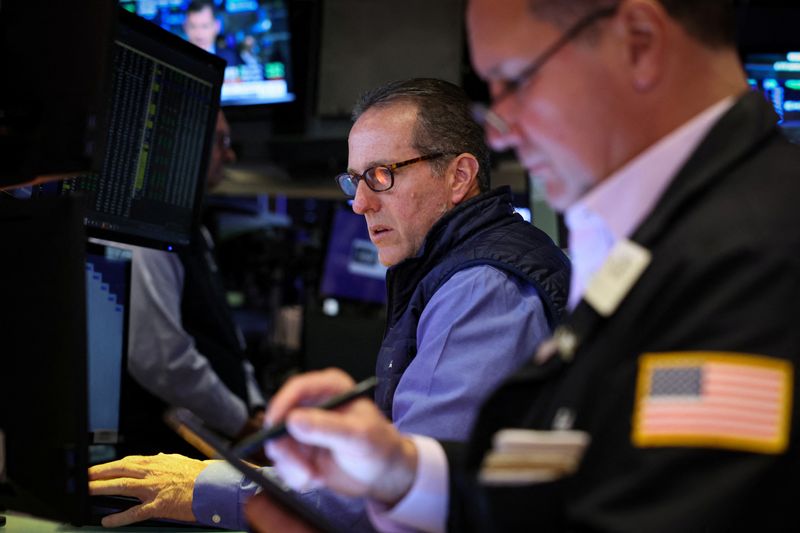By Shristi Achar A and Noel Randewich
(Reuters) - The S&P 500 ended lower and the Nasdaq higher on Thursday after U.S. inflation data matched estimates, underscoring expectations the Federal Reserve could pause its monetary tightening, while Salesforce (NYSE:CRM) climbed following an up upbeat forecast.
The Nasdaq reached its highest in over four weeks after a Commerce Department report showed the Personal Consumption Expenditures (PCE) price index, considered the central bank's preferred inflation gauge, climbed 3.3% in July on an annual basis, in line with expectations.
Excluding volatile food and energy components, the core PCE price index rose 4.2% in July, year-on-year, also in line with estimates.
Traders' expectations for a pause in rate hikes at the Fed's September policy meet remained at an 88.5% chance, while their bets on the central bank keeping rates unchanged in November stood at 51%, according to the CME Group's (NASDAQ:CME) FedWatch tool.
"Investors believe the Fed is data dependent, and the data is in the market's favor. All these interest rate hikes are paying off," said Jake Dollarhide, chief executive officer of Longbow Asset Management in Tulsa, Oklahoma.
Investors are awaiting more comprehensive non-farm payrolls data due on Friday for greater clarity on the Fed's likely monetary path.
The yield on the 10-year Treasury notes eased to 4.09%, lifting major growth stocks such as Amazon (NASDAQ:AMZN), which gained 2.2%.
The most traded stock in the S&P 500 was Tesla (NASDAQ:TSLA), with $27.7 billion worth of shares exchanged during the session. The electric car maker's shares rose 0.46%.
Salesforce rallied 3% following upbeat revenue forecasts from the cloud-based software provider as it benefits from price hikes and a resilient demand.
Weekly jobless claims for the week ended Aug. 26 fell to 228,000, compared with estimates of 235,000 claims, reining in investor sentiment, the Labor Department said in a report.
The data follows smaller-than-expected growth in private payrolls on Wednesday that signaled a softening labor market and drove the S&P 500 to a three-week closing high.
The S&P 500 declined 0.16% to end at 4,507.66 points.
The Nasdaq gained 0.11% to 14,034.97 points, while Dow Jones Industrial Average declined 0.48% to 34,721.91 points.
All three main indexes posted losses for August, with the S&P 500 and Nasdaq logging their first monthly declines since February.
For the month, the S&P 500 fell 1.8%, the Dow fell 2.4% and the Nasdaq fell 2.2%.
Of the 11 S&P 500 sector indexes, seven declined on Thursday, led lower by healthcare, down 1.21%, followed by a 1.03% loss in utilities.
Among other stocks, Dollar General (NYSE:DG) slumped 12% after the discount retailer cut its annual same-store sales forecast. Rival Dollar Tree (NASDAQ:DLTR)'s shares fell 1.7%.
Dismal manufacturing data from China hit the U.S.-listed shares of Chinese companies JD (NASDAQ:JD).com and Baidu (NASDAQ:BIDU), down 2.2% and 1.6%, respectively.
Declining stocks outnumbered rising ones within the S&P 500 by a 1.8-to-one ratio.
The S&P 500 posted 22 new highs and four new lows; the Nasdaq recorded 71 new highs and 101 new lows.
Volume on U.S. exchanges was relatively light, with 10.2 billion shares traded, compared to an average of 10.5 billion shares over the previous 20 sessions.
